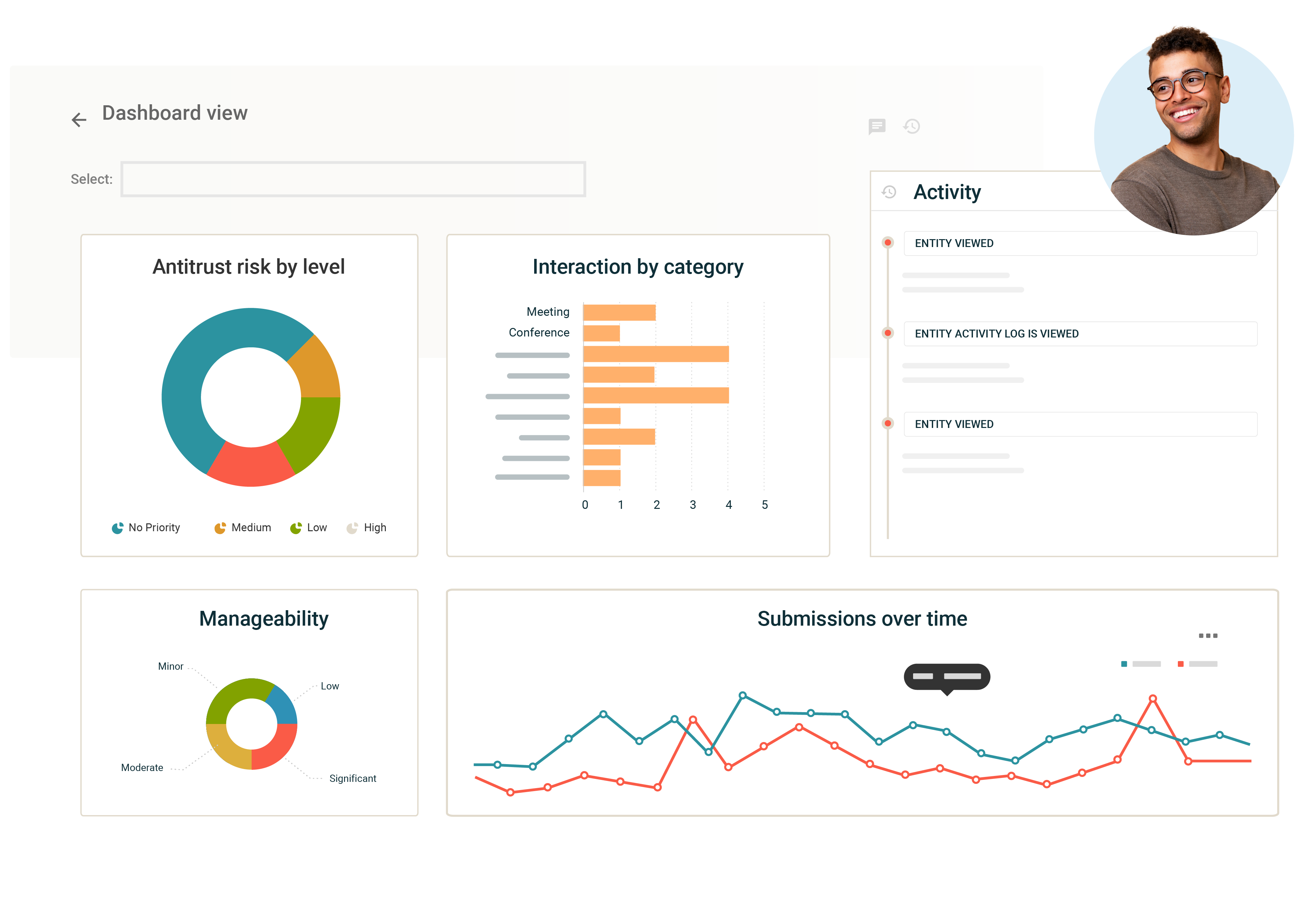Oil & Gas
Oil & Gas Compliance Software
Benefit from a centralized and data-driven approach to corporate compliance and third-party risk management - that’s trusted by major oil & gas companies around the globe. Capture a sophisticated picture of overall regulatory risk and compliance in one place.

Trusted by the world’s leading oil & gas companies


Why leading oil and gas companies rely on GAN Integrity
GAN Integrity is how compliance teams at oil and gas companies get the tools and expertise to stay ahead of risk. With less effort and more reach, you finally get a better way to do your good work.
See everything – Gain a comprehensive view of overall risk and compliance in one centralized platform for more effective program management.
Adapt to anything – Leverage dynamic workflows and integrations to stay ahead of regulatory changes and evolving program requirements, all without heavy lifting or expense.
Get all the help you need – Receive dedicated support from GAN Integrity’s team of experts.
Compliance challenges for the oil and gas industry

As a compliance professional in the oil and gas industry, you are tasked with ensuring your company complies with a complex web of regulations, standards, and guidelines. These regulations span a wide range of jurisdictions - local, national, and international - and encompass a broad spectrum of risk types.
Oil and gas companies face unique compliance challenges, including environmental risks, stringent health and safety standards, and complex upstream and downstream logistical operations. Doing business in this industry often requires interactions with government officials, either directly or through intermediaries, which increases the risk of anti-bribery and corruption violations. Additionally, compliance responsibilities extend beyond the company's immediate operations and into third-party risk management and compliance.
Key areas of compliance in oil and gas companies
Oil and gas enterprises are complex organizations. There’s many areas of ethics and compliance that need to be managed, spanning everything from Environmental Compliance, to ABAC Compliance to Health and Safety. These include:
- Environmental Compliance: Adhering to regulations aimed at minimizing the ecological footprint of upstream and downstream oil and gas activities.
- ABAC Compliance: Ensuring that anti-bribery and anti-corruption (ABAC) laws and standards are upheld.
- Supply Chain Due Diligence: Ensuring suppliers and partners also comply with relevant laws and standards. Due diligence may now be expected deeper into the supply chain, beyond tier 1.
- Cybersecurity: Safeguarding sensitive information and systems in an increasingly digital landscape.
- Labor Laws: Observing fair employment practices and labor standards.
- Intellectual Property Security: Protecting and respecting patents, trademarks, and copyrights.
- Export Controls: Complying with international trade laws.
- Vessel Sanctions Compliance: Ensuring business activities are not conducted with sanctioned vessels or maritime services.
- Workplace Safety: Implementing standards for a safe working environment.
- Continuous Improvement: Regularly updating and enhancing compliance measures.
Steps to achieving compliance in the oil and gas industry
Achieving compliance in any organization involves a series of strategic steps:
Compliance in the Oil & Gas Industry
Risk Assessment
Identifying potential compliance risks.
Objective Setting
Defining clear compliance goals.
Documentation
Keeping thorough records of compliance efforts.
Training
Educating employees about compliance requirements.
Monitoring and Auditing
Regularly reviewing compliance status.
Reporting System
Establishing clear channels for reporting issues and disclosures
Issue Response
Quickly addressing non-compliance issues.
Continuous Improvement
Regularly updating compliance practices.
GAN Integrity for Oil & Gas Companies
Our compliance software for oil & gas helps companies navigate these challenges with a unified, easy-to-use compliance platform that organizes requirements, automates tasks, and provides powerful reporting, making it easier for you to do your good work. With GAN Integrity, compliance teams can see everything, adapt to anything, and get all the help they need.
ABAC Program Management
Ensure your organization upholds ethical integrity and ABAC compliance through comprehensive risk assessments, effective policy management, and continuous monitoring. Capabilities include:
- Third-party due diligence: Mitigate bribery and corruption risks with integrated questionnaires, sanctions checks, and risk intelligence data.
- Disclosure management: Consolidate and assess conflicts of interest, gifts, travel, entertainment, and political and charitable contribution disclosures.
- Reporting and documentation: Maintain a complete audit trail and detailed reporting to easily demonstrate compliance to stakeholders and regulators.
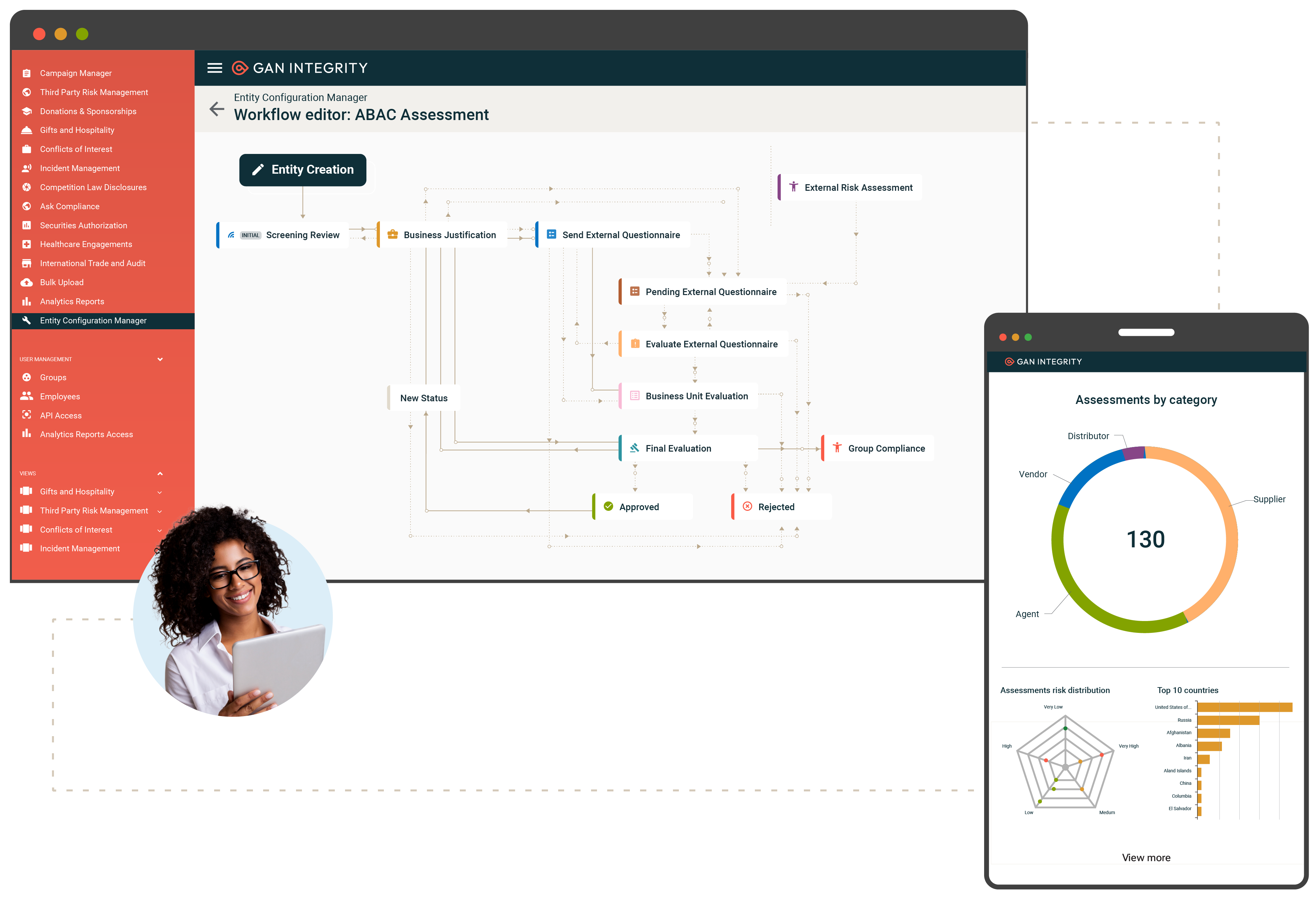
Gifts and Entertainment
Manage Gifts and Entertainment disclosures with an easy to use, configurable platform. Capabilities include:
- Flexible Processes: Adapt disclosure intake forms and workflows to your business processes.
- Campaign management: Set up campaigns to inform and engage employees in your disclosure program.
- Third-party risk integration: Track gifts and entertainment disclosures against third parties and suppliers for a holistic view of risk.
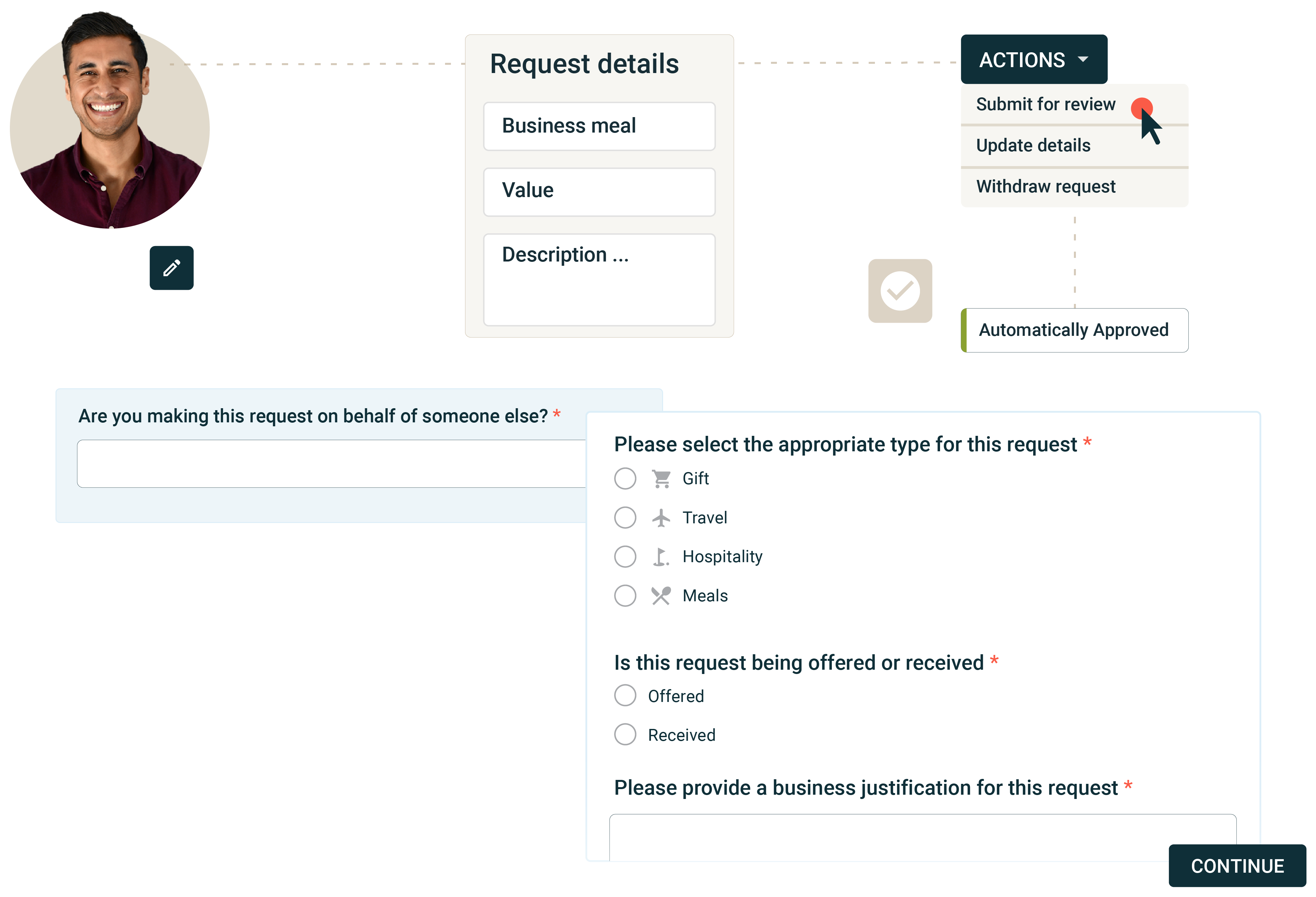
Supply Chain Due Diligence
Enhance supply chain risk management by consolidating processes, identifying and mitigating risks, and integrating data from various risk intelligence and business systems. Capabilities include:
- Automated risk assessments and continuous monitoring: Monitor suppliers continuously for adverse media, sanctions lists, PEP lists, forced labor, and ESG (Environmental, Social, and Governance) issues.
- High-risk supplier identification and management: Identify high-risk suppliers, manage them effectively, and track actions and mitigations to ensure compliance.
- Integrated due diligence assessments: Perform thorough due diligence across your business operations and workflows for seamless integration and enhanced efficiency.
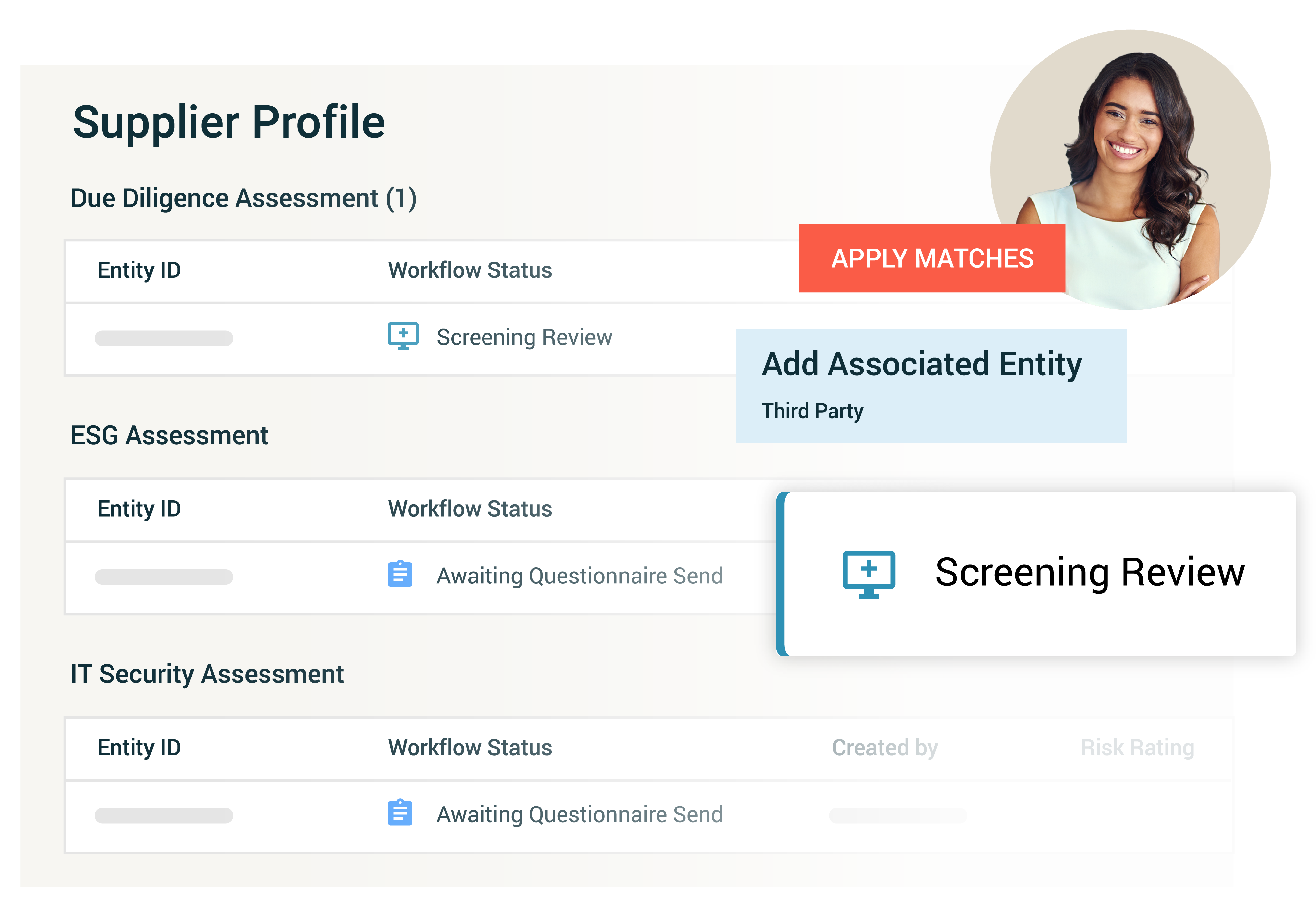
Disclosure Management
Consolidate your disclosures for conflicts of interest, gifts, travel, entertainment, and political and charitable donations or contributions. Capabilities include:
- Policy management: Develop and enforce comprehensive disclosure policies. Educate and engage your workforce with targeted training and policy attestations.
- Flexible disclosure process: Simplify the submission of potential conflicts of interest with user-friendly forms, ensuring easy access for employees.
- Automated approvals and reviews: Enhance compliance with automated approval and review workflows. Quickly escalate notifications to relevant stakeholders to address potential risks.
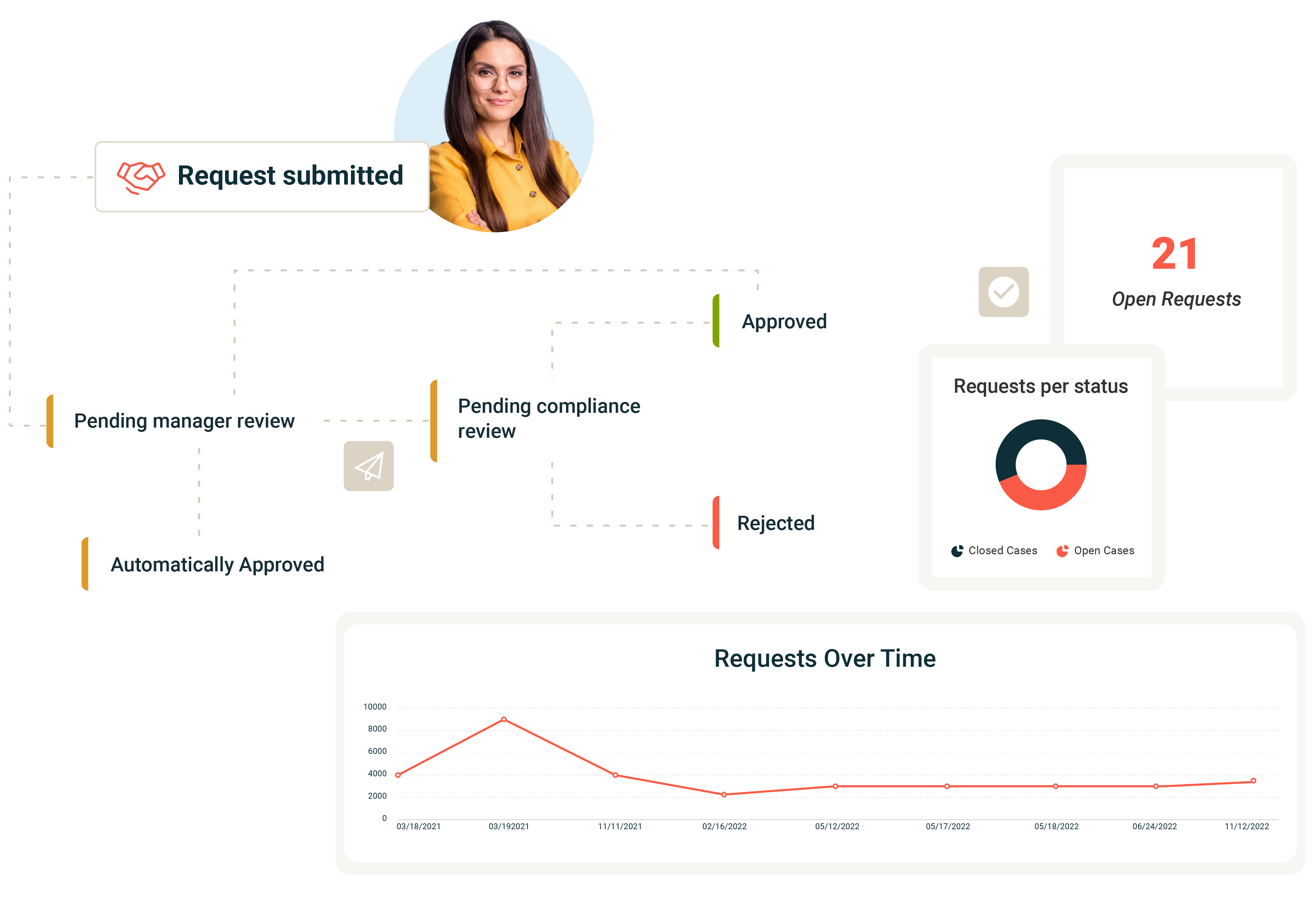
Reporting and Documentation
See everything across your compliance program, and generate reports and dashboards to demonstrate compliance program effectiveness to stakeholders and evidence to regulators. Capabilities include:
- Reporting and analytics: Executive, role-based dashboards to review the effectiveness of your compliance program initiatives.
- Evidence-based compliance: Maintain an auditable trail of all activity with the platform’s integrated and automated audit log.
- Compliance insights: See risk trends and patterns within your program, including third-party and supply chain risk, policies and disclosures.
